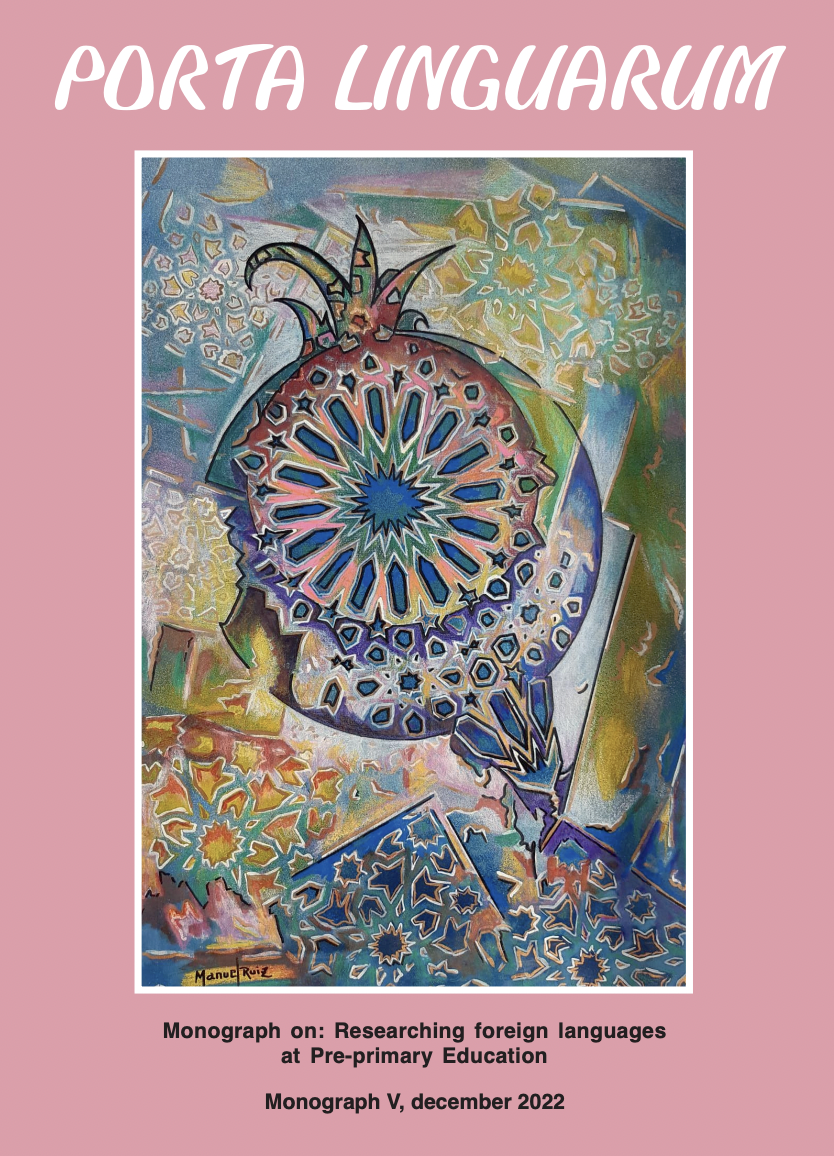Preface. Preface Special Issue ‘Researching foreign languages at Pre-primary Education’
DOI:
https://doi.org/10.30827/portalin.vi.27162Keywords:
foreign languages, pre-primary education, research, ECE
Agencies:
Vicerrectorado de Investigación y Transferencia de la Universidad de Granada
Abstract
Preface. Special Issue ‘Researching foreign languages at Pre-primary Education’
Downloads
Download data is not yet available.
References
Council of Europe (2019). Council Recommendation of 22 May 2019 on High-Quality Early Childhood Education and Care Systems. Available at https://op.europa.eu/es/publicationdetail/-/publication/38e20eca-876b-11e9-9f05-01aa75ed71a1/language-en/format-HTML/source-120618859
European Commission. (2011). Language learning at pre-primary school level: Making it efficient and sustainable. European Strategic Framework for Education and Training (ET 2020).
http://ec.europa.eu/dgs/education_culture/repository/languages/policy/language-policy/documents/early-language-learning-handbook_en.pdf
Mourão, S. (2015). English in Pre-Primary: The challenges of getting it right. In Janice Bland (Ed.), Teaching English to Young Learners : Critical Issues in Language Teaching with
3–12 Year Old (pp. 51-70). Bloomsbury Academic.
Mourão, S. (2019). Research into the teaching of English as a Foreign language in early childhood education and care. In S. Garton & F. Copland (Eds.), The Routledge handbook of
teaching English to young learners (pp. 425-440). Routledge.
Schwartz, M. (Ed.) (2022). Handbook of Early Language Education. Springer.
United Nations Educational, Scientific and Cultural Organization. (2016). Education 2030. Incheon declaration and Framework for action for the implementation of Sustainable Development Goal 4. Ensure inclusive and equitable quality education and promote lifelong learning
opportunities for all. UNESCO.
Vygotsky, L. S. (1978 /1930). Mind in society: The development of higher psychological processes (Eds. and trans: Cole, M., John-Steiner, V., Scribner, S., & Souberman, E.). . Cambridge, MA: Harvard University Press.
European Commission. (2011). Language learning at pre-primary school level: Making it efficient and sustainable. European Strategic Framework for Education and Training (ET 2020).
http://ec.europa.eu/dgs/education_culture/repository/languages/policy/language-policy/documents/early-language-learning-handbook_en.pdf
Mourão, S. (2015). English in Pre-Primary: The challenges of getting it right. In Janice Bland (Ed.), Teaching English to Young Learners : Critical Issues in Language Teaching with
3–12 Year Old (pp. 51-70). Bloomsbury Academic.
Mourão, S. (2019). Research into the teaching of English as a Foreign language in early childhood education and care. In S. Garton & F. Copland (Eds.), The Routledge handbook of
teaching English to young learners (pp. 425-440). Routledge.
Schwartz, M. (Ed.) (2022). Handbook of Early Language Education. Springer.
United Nations Educational, Scientific and Cultural Organization. (2016). Education 2030. Incheon declaration and Framework for action for the implementation of Sustainable Development Goal 4. Ensure inclusive and equitable quality education and promote lifelong learning
opportunities for all. UNESCO.
Vygotsky, L. S. (1978 /1930). Mind in society: The development of higher psychological processes (Eds. and trans: Cole, M., John-Steiner, V., Scribner, S., & Souberman, E.). . Cambridge, MA: Harvard University Press.
Downloads
Published
2023-01-18
How to Cite
Cortina-Pérez, B., & Otto, A. (2023). Preface. Preface Special Issue ‘Researching foreign languages at Pre-primary Education’. Porta Linguarum An International Journal of Foreign Language Teaching and Learning, 7–9. https://doi.org/10.30827/portalin.vi.27162
Issue
Section
V Special Issue. "Researching foreign languages at Pre-primary Education"



















